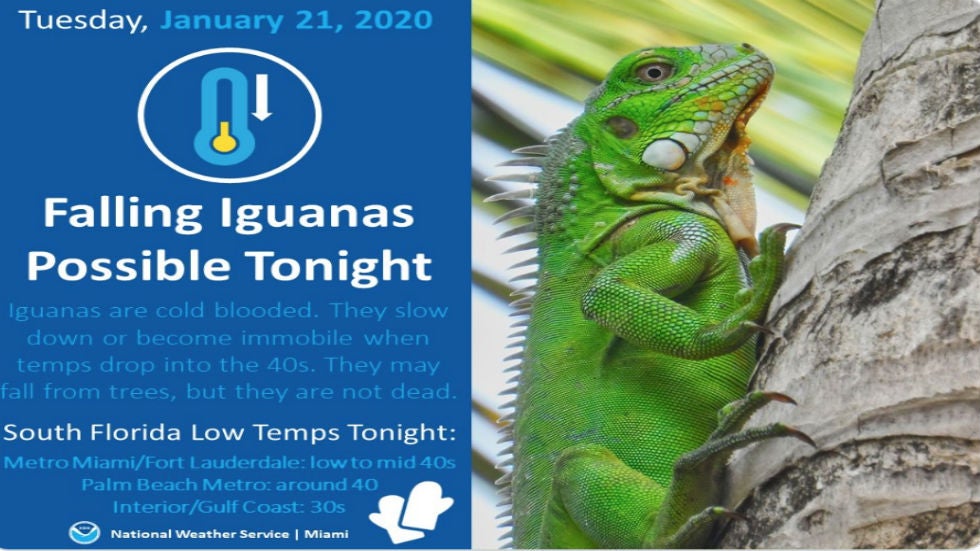Cold-stunned iguanas fell from trees in South Florida Wednesday morning as temperatures in Miami hit 40 degrees - the lowest recorded there in more than nine years.
The National Weather Service in Miami issued a "falling iguanas" alert on Tuesday.
"This isn't something we usually forecast, but don't be surprised if you see Iguanas falling from the trees tonight as lows drop into the 30s and 40s," the agency tweeted Tuesday. "Brrrr!"
Some residents of South Florida tweeted photos and videos of cold-stunned iguanas Wednesday morning.
Miami International Airport officially recorded a low temperature of 40 degrees Wednesday morning. That is Miami's coldest temperature since Dec. 28, 2010 when it fell to 39 degrees.
Suburbs around Miami and Fort Lauderdale woke up to wind chills in the middle 20s this morning.
While the iguana warning might be slightly tongue-in-cheek, it's no joke. Much like human Floridians, iguanas go into a bit of shock when the state's weather departs from its typical warm, sunny nature.
Because iguanas are cold-blooded animals, their metabolism slows way down and they become more and more lethargic as temperatures drop lower than what they are used to. They can become completely immobile when temperatures dip into the 30s and 40s. When that happens while they're up in a tree, the large lizards can come crashing down to the ground.
The lizard-chilling phenomenon was last seen during a cold snap in January 2018, when the mercury dipped to 44 degrees and photos and video popped up on social media of "raining" iguanas and dozens of them laying on the ground not moving.
Immobilized iguanas might look like iguana popsicles, but they're not really frozen. They can be pretty feisty when they come back to life, as one South Florida man reportedly discovered when he loaded a bunch of cold-stunned iguanas into his car to try and save them.
Green iguanas can grow up to five feet long and can weigh as much as 17 pounds, according to the Florida Fish and Wildlife Conservation Commission (FWC).
The animals are common in South Florida, but they aren't native to the state and are considered an invasive species. They're also a nuisance, causing damage to sidewalks, seawalls and other infrastructure when they burrow underground to lay their eggs. The city of West Palm Beach is facing $1.8 million in emergency repairs after digging iguanas damaged a dam.
Last summer, the FWC came under fire for a strongly worded message that urged residents to kill iguanas found on their property "whenever possible."
Their numbers have exploded in recent years, at the same time the region has seen several years of record-breaking heat and mild winters.
The record low for Miami stands at 30 degrees, set on Jan. 22, 1985. And except for 2018, the past few years have been warmer than usual.
"We're going through multiple winters that are failing to get as cold as almost every winter did a few decades ago," Weather Underground climate blogger Bob Henson said. "This is happening at the same time that iguana populations are multiplying across South Florida."

The Weather Company’s primary journalistic mission is to report on breaking weather news, the environment and the importance of science to our lives. This story does not necessarily represent the position of our parent company, IBM.
The Weather Company’s primary journalistic mission is to report on breaking weather news, the environment and the importance of science to our lives. This story does not necessarily represent the position of our parent company, IBM.

No comments:
Post a Comment